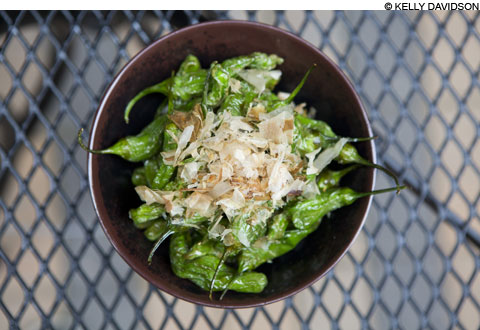
ONE WITH EVERYTHING At Moksa, the menu of small plates — like this one, "Dancing Shishito
Peppers" — are tasty, but not quite nirvana-inducing. |
Moksa, or moksha, is the concept in Buddhism and Hinduism of enlightenment by way of release from the mental bonds of reality. Chef/co-owner Patricia Yeo is a true fusionista, with international heritage, training, and interest. She has some good food here but, insofar as I could taste, she is not yet fully released from those mental bonds. Moksa features a menu of small plates; Yeo's best description of the theme is "Asian tapas."
Vegetarian and vegan types have a best buy with "Vietnamese Summer Roll, Vegetables and Herbs" ($3), cut into five pieces rolled up with broccoli, cucumber, cilantro, and bell pepper, and served with a predictable sweet hot pepper dip, and a novel herbal dip, also with serious bite. Edamame potstickers ($6) are another vegan delight, with some chew to the pasta and a bit of crunch to the filling along with the expected ginger. I didn't miss the traditional pork filling.
Moving up to a promising noodle menu, we passed over Yeo's family "silver pin noodles" for mushroom chow fun, kai lan ($14). Now this is fusion with a capital F, because the mushrooms are a mix of shiitake and portabella, with some little Asian caps thrown in, and the pasta is actually more like a fresh, whole-wheat papardelle than what we've known as chow fun. Are well-made papardelle better in this dish than the wok-seared, hand-cut sheets of rice noodle would be? It is one of those subtle questions in life, like what was the best line-up of Art Blakey's Jazz Messengers: the one with Wayne Shorter and Lee Morgan, or the one with Bill Pierce and Wynton Marsalis? You could chew on that a lot longer than you will need to wolf down this small, flavorful bowl, greatly enhanced by chopped Chinese broccoli, the "kai lan" part — and my personal favorite brassica of all time.
"Dancing Shishito Peppers" ($6) used a trick I first saw 18 months ago at Bon Chon (but which has been around at least a decade), of using shaved smoked tuna flakes, "katsuobushi," that "dance" above a hot dish. The fish papers add a piquant note to Japanese-developed chilies that are usually but not reliably sweet with a lot of flavor. Our server suggested that about one in nine are slightly hot, and my draw of seven included two hot ones and one middling.
Moving up to seafood, "Spicy Shellfish and Kim Chi Udon" ($15) was a small bowl of hand-cut thick rice spaghetti, with both fresh and fermented Napa cabbage. Hot pepper pleasantly suffused the entire dish of squid, mussels, and shrimp, as well as some really hot green pepper rings, possibly from a serrano chili, which one can avoid.
Meat-wise, there are some exotics, but basic "Silk Road lamb meatballs" ($5) are economical (six racquetball-size) and surprisingly non-descript in flavor. A special on steak rendang ($16), a dish Yeo has done successfully elsewhere, is just a small portion of fine sirloin under an Indonesian-style sauce.